Seven Feasts Series (1) (Background)
Feast of Trumpets (Christian holiday)
From Wikipedia, the free encyclopedia
| This article is written like a personal reflection or essay and may require cleanup. Please help improve it by rewriting it in an encyclopedic style. (August 2008) |
- See also Rosh Hashanah also called a "Day [of] teruah" ("Blowing [of the Shofar]/Trumpeting" in the Torah) about Judaism's New Year Jewish holy day.
The Feast of Trumpets is a Biblical holy day observed by Bible believers who keep the Seven Feasts of Israel. It is also known as the Jewish holy day Rosh Hashanah. Evangelical Christians are also interested in the Feast of Trumpets. Most view its fulfilment as a key waypoint into the End times. They believe that this epic future "day of the blowing of the shofar" will be a landmark day in history.
The Bible refers to the day as "The Day of the Blowing of the Shofar" (Yom Terua, Leviticus 23:24), and rabbinic literature and the liturgy itself describe Rosh Hashanah as "The Day of Judgment" (Yom ha-Din) and "The Day of Remembrance" (Yom ha-Zikkaron). Some midrashic descriptions depictGod as sitting upon a throne, while books containing the deeds of all humanity are opened for review, and each person passing in front of Him for evaluation of his or her deeds. A shofar is normally a trumpet made from a ram's or goat's horn.
Contents[hide] |
[edit]Date
The Feast of Trumpets is specifically and biblically the first day of the month of Tishri. Leviticus 23:24 states, "Speak to the children of Israel, saying: 'In the seventh month, on the first day of the month, you shall have a sabbath-rest, a memorial of blowing of trumpets, a holy convocation" (NKJV). It is the only Hebrew feast to occur on a new moon.
The Jewish festival of Rosh Hashanah always occurs in the month of September or October in modern calendars. It extends over the first two days of the Hebrew month of Tishrei, even in Israel where most holy days last only one day. (Since days in the Hebrew calendar begin at sunset, the beginning of Rosh Hashanah is when sunset occurs at the end of the 29th of Elul.)
The second day is a later addition and does not follow from the literal reading of the Biblical commandment, which states that the holy day should be celebrated on the first day. Christians who observe the Feast of Trumpets typically only celebrate it on one day (the first of Tishri).
[edit]New Testament
Many believe that this day represents what is referred to throughout the entire Bible as "The Day of the LORD", the future time when Christ will return, fight the rebellious nations of the earth and establish His world-ruling government, the Kingdom of God.
There are many New Testament passages that mention trumpets, and those who observe the Feast of Trumpets consider that these trumpet blasts and the events mentioned in the New Testament are the actual fulfillment of what this day actually represents in Leviticus 23 and other passages in the Torah.
For example, one passage from the Torah suggests a future fulfillment is Isaiah 27:13, which states "So it shall be in that day: The great trumpet will be blown; They will come, who are about to perish in the land of Assyria, And they who are outcasts in the land of Egypt, And shall worship the LORD in the holy mount at Jerusalem" (NKJV).
Many of the "New Testament" passages are in the Book of Revelation, where there is a blowing of seven trumpets. In chapter 8, verse 6 it states, "So the seven angels who had the seven trumpets prepared themselves to sound." The subsequent verses describe a variety of punishments somewhat intended to encourage humans to repent (which chapter 9 verse 20 suggests that they do not do). However, the Book of Revelation does suggest that positive developments occur on the seventh (and final) trumpet blast, but in the days of the sounding of the seventh angel, when he is about to sound, the mystery of God would be finished, as He declared to His servants the prophets (Revelation 10:7).
Specifically, many believe that Yeshua will return on the final trumpet blast. This is partially based up Paul's writing in 1 Thessalonians 4:16-17:
-
- For the Lord Himself will descend from heaven with a shout, with the voice of an archangel, and with the trumpet of God. And the dead in Christ will rise first. Then we who are alive and remain shall be caught up together with them in the clouds to meet the Lord in the air. And thus we shall always be with the Lord. NKJV
Others who do not observe the Feast of Trumpets normally do acknowledge that the New Testament teaches that Yeshua will return with the sound of a trumpet. It is said to be
[edit]John Chrysostom
People who observe the Feast of Trumpets have sometimes been subject to ridicule or condemnation.
Here is some of what the Roman Catholic saint John Chrysostom preached the following in 387 A.D.:
- The festivals of the pitiful and miserable Jews are soon to march upon us one after the other and in quick succession: the feast of Trumpets, the feast of Tabernacles, the fasts. There are many in our ranks who say they think as we do. Yet some of these are going to watch the festivals and others will join the Jews in keeping their feasts and observing their fasts. I wish to drive this perverse custom from the Church right now...If the Jewish ceremonies are venerable and great, ours are lies...Does God hate their festivals and do you share in them? He did not say this or that festival, but all of them together. (John Chrysostom. Homily I Against the Jews I:5;VI:5;VII:2. Preached at Antioch, Syria in the Fall of 387 AD. Medieval Sourcebook: Saint John Chrysostom (c.347-407) : Eight Homilies Against the Jews. Fordham University.http://www.fordham.edu/halsall/source/chrysostom-jews6.html 12/10/05).
John Chrysostom preached against the Fall holy days then, because some who professed Christ were observing them. It is interesting to note that he must have realized that the second century church kept Passover the same time as the Jews did (this was even true in the early second century in Rome). And that the Catholic Church still kept Pentecost when he wrote that. Hence it is unclear why he railed against some "feasts of the Jews" and not others.
Those who continue to observe these days consider that they are Biblical Feasts of God, citing Leviticus 23:1 where God calls them "My feasts".
[edit]Book of Life
Some Christians, like most who hold to the Jewish faith, believe that the Feast of Trumpets has a tie to the Book of Life. Some Christians who observe the Feast of Trumpets tie together the fact that true believers, those whose names are in the Book of Life, are the ones who are resurrected at the final great trumpet. The Bible states that the righteous have their names written in the Book of Life and that they will be rewarded on a future climactic Day of Atonement or Day of Reckoning, and that they will be rewarded on Tishri 1.
According to Revelation 20:11-15, those who are 'dead',whose names are not written in the Book of Life, will be judged according to their own works. Not by the 'Blood Covenant',created by the Messiah, which "takes away the sin of the world." (Daniel 9:26)
- Then I saw a great white throne and Him who sat on it, from whose face the earth and the heaven fled away. And there was found no place for them. And I saw the dead, small and great, standing before God, and books were opened. And another book was opened, which is the Book of Life. And the dead were judged according to their works, by the things which were written in the books. The sea gave up the dead who were in it, and Death and Hades delivered up the dead who were in them. And they were judged, each one according to his works. Then Death and Hades were cast into the lake of fire. This is the second death. And anyone not found written in the Book of Life was cast into the lake of fire.
Jewish tradition also teaches that those that are not truly wicked (the intermediate) will not be saved or destroyed at that time, but that they will have a ten day period until the Day of Atonement (which they call Yom Kippur) for judgment.
While this time of judgment is mentioned in Revelation 20:11-15, "Then I saw the souls of those who had been beheaded for their witness to Jesus and for the word of God, who had not worshiped the beast or his image, and had not received his mark on their foreheads or on their hands. And they lived and reigned with Christ for a thousand years. But the rest of the dead did not live again until the thousand years were finished. (This is the first resurrection."), According to the Word of God there is No "Intermediate". A person must com into a Blood Covenant with the 'Suffering Servant' of Isa.53.
[edit]End-time chronology
| This section does not cite any references or sources. Please help improve this article by adding citations to reliable sources. Unsourced material may be challenged and removed. (November 2007) |
Evangelical Christians, who are generally pre-millennialists are increasingly interested in the Seven Feasts of Israel.
The first four of the Feasts of Israel have been fulfilled in the New Covenant. Jesus Christ was crucified on Passover, the 14th of Nisan. (Believers in the Messiah believe He was the promised Sacrifice Lamb, the Savior sent into the world as a 'Light to the World'. He was laid in the tomb on the same day just before sunset, for the Feast of Unleavened Bread which came on the 15th of Nisan. He rose from the dead three days and three nights after Passover on the 17th of Nisan. Fifty days later, on the Day of Pentecost, the Holy Spirit fell on the 120 in the upper room. The Day of Pentecost was the day on the Hebrew calendar when Moses brought down the Torah from Mount Sinai to establish the Old Covenant. In the crucifixion year the Day of Pentecost came into its New Covenant fulfilment. The birthday of the Church occur on that very same day on the Hebrew calendar. Many evangelical Christians consider that these first four of the Feasts of God came into their New Covenant fulfilment during the spring and summer of the year of Christ's passion. The Fall Feasts are yet to be fulfilled. Quite understandably many Christians with a biblical world view are wondering what will come next.
The first four of the seven Feasts of God have been fulfilled in epic fashion. The Fall Feasts, the Feast of Trumpets and the Day of Atonement, await fulfilment. There is a growing belief among evangelical Christian believers that these fifth and sixth feasts will erupt into their ultimate New Covenant fulfilment in just as spectacular fashion as the former ones did. These will be two epic and climactic days breaking forth in future holy history. Some Bible scholars believe that the next feast to be fulfilled, the Feast of Trumpets, which is Rosh Hashanah, (or the Hebrews New Year), will mark the occasion in which the epic peace treaty prophesied by the prophet Daniel in Daniel 9:27 will be confirmed. This will be a day of great searchings of the heart for all those who love Israel. Eretz Israel, the land said to be owned by Israel in a trust with YHVH/God will be divided up. Sovereign land and sovereign political power will be handed over by God's covenant people to a coming global peacemaker. The covenant will be for a term of seven years. The information concerning this future treaty, which will promise peace to the Middle East, was given to the prophet Daniel by the angel Gabriel. This is an extremely important prophecy for all Jews and for all Christians. The disposal of YHVH/God's Holy Land by covenant to the powers of this world is not a light matter. Like most treaties it will lead to war. In this case, the fallout will be very serious. The treaty will supposedly lead on seven years later to the Battle of Armageddon and to the coming of Messiah as Judge of the nations. At that time He will deliver His people, those in Jerusalem at Armageddon and also out in the nations at the Bozrah deliverance.
Some Bible students are coming to believe that the Feast of Trumpets will herald the seven year peace covenant of Daniel 9:27. This awesome future event fits the spirit, nature, and character of the Feast of Trumpets very well. Evangelicals have also noticed that the timespan encompassing theFeast of Trumpets and the Day of Atonement (Christian holy day) when they are seven years apart and when they comprise 86 moons on the metatonic cycle, (and not 87 moons), is 2550 days.
86 moons = 86 x 29.530589 days + 10 days = 2550 days (inclusive). This is the timespan that begins on Tishri 1 in year X and extends out seven years to Tishri 10 on year X + 7.
2550 days is a very special number of days. It happens to very precisely encompass the timespan of the 70th week of Daniel with the 30 day extension of the second half of the 70th Week going beyond the 1260 days to the 1290 days. This period of 1290 days was prophesied by Daniel in Dan.12:11. The number of days for the final seven years of this age then becomes, - 1260 days + 1290 days = 2550 days.
There is a perfect agreement of the two timespans. And the nature of the Feast of Trumpets and the Day of Atonement fits the Dan.9:27 seven year covenant and the last day, the Day of Reckoning respectively. This seems to indicate that the final seven years of this age will begin on a Jewish new year somewhere in the September-October time of the year.
The calculations of these Feast of Trumpets to Day of Atonement timespans across 86 moons or across seven years are simple and easily verifiable. They can be confirmed quite readily using lunar data from the United States Naval Observatory or by using the Hebrew Calendar Converter available online at Hebcal.com.
The Feast of Trumpets is yet to erupt into world history. The entire prophecy of Joel relates to the latter days. It features the coming of a stupendous day of celebration, and also shock and awe. The nature, character, and spirit of the shofar being blown in alarm and its attendant call to assembly before YHVH/God fits the stark reality of what will happen on this epic future day. Israel will enter into a binding covenant with a global peacemaker. The deal will be for a term of seven years. The prophet Daniel gives details of this landmark event in Dan. 9:27. Moses warned the covenant people of YHVH-God that their disobedience would lead them into tribulation in the latter days. This prophecy is recorded in Deut.4:29-31. Jesus Himself spoke of His people entering into covenant with one who would come "in his own name". This is recorded in John 5:43.
The Holy Scriptures clearly indicate that the sovereign ground of Eretz Israel will be divided up. The Holy Land will be ceded to someone who is outside the covenant. Here is Joel's word to God's covenant people when they see this happen.
- Joel 2
- 15 "Blow the trumpet in Zion, Consecrate a fast, Call a sacred assembly;
- 16 Gather the people, Sanctify the congregation, Assemble the elders,
- Gather the children and nursing babes;
- Let the bridegroom go out from his chamber, And the bride from her dressing room.
- 17 Let the priests, who minister to the Lord weep between the porch and the altar; ..."
The Feast of Trumpets is the very next feast due to come into its epic New Covenant fulfilment. Because of the reasons given above many evangelicals believe that this next feast will be the Daniel 9:27 treaty and that this will be the terminus of the Road map for peace in the Middle East. The 7 year treaty will be confirmed on a very auspicious day. On a future Hebrew New Year Israel will sign this seven year peace treaty. They will enter into covenant with a global peacemaker. This prince will be a megadealer from outside the covenants of Israel. Daniel's prophecy clearly indicates that this man will eventually turn out to be a false messiah. This explains the trumpets or shofars being blown on that awesome future day. It will be a day of combined celebration and alarm.
[edit]Conclusion
Several Christian groups observe the Feast of Trumpets and those that do believe it has prophetic importance (although the prophetic understandings do vary somewhat by group). They have not accepted the criticism that it is only intended as a Jewish practice that they should not observe. They consider that this Feast of the Lord, the God of Israel, involves all who have entered into covenant with Israel's Messiah and not only the royal Jewish house of Judah. The basis for this is the Apostle Paul's explanation in Ephesians 2:12-13 in which he tells believers in the Savior of Israel that they "were once uncircumcised, (heathen pagans), strangers to the covenants of Israel and outside the Commonwealth of Israel. But now, through the blood of Christ, (the Anointed One of Israel), they have been brought near." (That is, into the Commonwealth of Israel). So their ultimate essential identity in Israel as blood covenant Christians does not come by the bloodline of DNA lineage, (although this is certainly happening as well in many cases). But Christian believers and Messianic Jewish believers are brought into their essential identity in Israel by the blood of Israel's Messiah, the promised Seed of Abraham. (Gal.3:29) This divine blood covenant sacrifice for Israel and for the world occurred in Messiah's first coming as the Suffering Servant of whom the prophet Isaiah spoke about repeatedly. (See Isaiah 53)
Some Christians and Messianic Jews hold to what is called the "two house" view of Israel. They look back to the great divorce of Israel after the death of Solomon which is termed the "Breach of Jeroboam" and consider it extremely important since it divided Israel into two kingdoms. The northern ten tribes were taken captive first. They lost their sovereignty and were led away captive by the Assyrians who deliberately scattered them into the nations. The Northern Kingdom of ten tribes was lost. The prophet Hosea in the names of his children declares that nationally these descendants of the Norther Kingdom of Israel were declared by YHVH-God to be "not my people". (Hosea 1:9) The lost tribes became as pagans and remained that way until some of them began to be picked up in the New Covenant. The prophet Jeremiah spoke about this inner transformation by the indwelling Torah in Jeremiah 31:31-33). Yair Davidiy of www.britam.org, a prominent Jewish authority on the lost tribes has gathered a considerable body of evidence that the lost tribes drifted west in their histories into Europe and beyond. His book, "The Tribes", presents convincing evidence of this. The Jewish nation of the Southern Kingdom of Judah know their Hebrew roots. They can trace a national lineage back to Israel. But many in the west have crusaded and shamefully murdered their Jewish brethren and engaged in an anti-Semitism based upon jealousy, ignorance, and a loathing of Israel's coming Messiah or Christ. (See King David's song of the conspiracy against Messiah in Psalm 2) Those who have accepted Israel's Messiah, no matter what race they belong to, are coming to understand their connection to Israel through Messiah. Isaiah spoke of the light of Israel going out beyond national Israel to the minister eternal life to the heathen gentiles. (Isa.49:6) The Apostle Paul states " And if you are Christ's, then you are Abraham's seed, and heirs according to the promise." (Galatians 3:29) This explains the current upwelling of interest in Hebrew roots. And the 7 Feasts of Israel as laid out by Moses in Leviticus 23 is a very big subject of discussion of late. Zola Levitt wrote a book named "The Seven Feasts of Israel" several years ago. And many Messianic groups such as elshaddaiministries.us are opening up this subject of the Fall Feasts of Israel and the Feast of Trumpets since the first four feasts have already come into their New Covenant fulfillment. The 5th feast, the Feast of Trumpets, is up next.
[edit]See also
- Day of Atonement (Christian holy day)
- Feast of Trumpets (disambiguation)
- First day worship
- Christian view of the Law
- Messianic Judaism
- Passover (Christian holy day)
- Supersessionism
- Armstrongism
[edit]Further reading
- Edward Chumney. The Seven Festivals of the Messiah. Treasure House, 1994. ISBN 1-56043-767-7
- Howard, Kevin. The Feasts Of The Lord God's Prophetic Calendar From Calvary To The Kingdom. Nelson Books, 1997. ISBN 0-7852-7518-5
[edit]External links
- Formula to calculate the dates of Rosh Hashanah
- The Book of Life and Rosh Hoshanah Discusses perspectives of those Church of God groups which follow Herbert Armstrong's teachings on the Book of Life and this Day
- Sermons on the Feast of Trumpets
- The coming fulfillment of the Feast of Trumpets
--------------------------------------------------------------------------------------------------------------------
The references above are not to be taken as exhaustive or consistent with all Bible Scholars but it mentions the generic version of the Study of the Seven Feasts, like watching a History Channel presentation, it is biased, but has some facts and some fancy yet still gets information into your hands.
Below you will read the Chabad or One Sect of Orthodox Judaism information on the Feast of Trumpets and is valuable for learning Traditions and some "connections" you might make as a Christian that the Jew may have overlooked or ignored rejecting Jesus as Messiah...so far.
--------------------------------------------------------------------- HaShem's Appointed Times By Hillel ben David (Greg Killian) In this study I would like to examine the symbolic connections between the festivals and our relationship and marriage with HaShem. Pesach (Passover - Nisan 15 - 21) when we followed HaShem into the wilderness to begin our relationship. This wilderness trek began on Pesach: Yeremiyahu (Jeremiah) 2:1 Moreover the word of HaShem came to me, saying, 2 Go and cry in the ears of Jerusalem, saying, Thus saith HaShem; I remember thee, the kindness of thy youth, the love of thine espousals, when thou wentest after me in the wilderness, in a land that was not sown. 3 Israel was holiness unto HaShem, and the firstfruits of his increase: all that devour him shall offend; evil shall come upon them, saith HaShem. and all that supported us for the 210 years we lived in Mitzrayim. We must leave our wicked ways and begin a new life. Yochanan (John) This word means “a constricted place”. Our leaving was the actual birth of the nation of Israel. the first and on the seventh days[3]. This feast is also known as Chag HaMatza, Leaven, as a remez for the evil inclination, is something we do not want our lover to find in us, yet without it we would never build the world. So, for seven days we do without, but then we leave that rarefied world and return to do the work HaShem set before us. This feast begins our physical freedom from Mitzrayim which is a remez for this world. On the seventh day, of this feast, we will cross the Red Sea and leave Mitzrayim, the land of sin. We will count forty-nine days from the second day of Pesach until Shavuot. This counting is the action of a bride who is looking forward to the time when she can be with Her Beloved, by counting the days. This period of preparation is called Sefirat HaOmer and has its own mitzva[4]: nor fresh ears, until this selfsame day, until ye have brought the offering of your God; it is a statute for ever throughout your generations in all your dwellings. 15 And ye shall count unto you from the morrow after the day after shall there be complete; 16 even unto the morrow after the seventh week shall ye number fifty days; and ye shall present a new meal-offering unto HaShem. After we count forty-nine days, HaShem will count the fiftieth for us, as He comes to meet us on the day of our betrothal. Chag Shavuot (Feast of Weeks - Sivan 6) The betrothal We now have HaShem’s law and we have thereby achieved spiritual freedom. One Shavuot very soon, HaShem will give us His new covenantand we will always obey him. This is the festival of leavened bread, represented by two huge, leavened, loaves of bread. Today, in Sefardi synagogues all around the world, they will be reading the document of betrothal between HaShem and His people. The Torah will serve as the ketubah, the marriage contract. This is the first part of a two part formal contract between HaShem and His spouse. After today, this new relationship can only be severed by a divorce. We do not live together, not do we have intimacy, but, in all other respects we are married. Today we experience the first part of the wedding ceremony, the erusin. After the erusin ceremony, the bridegroom (HaShem and His Mashiach) will return to prepare a home for the bride. This is a time of preparation that will build in intensity as we approach the day of kiddushin, the second part of the wedding ceremony. Yom Teruah – Rosh HaShanah (Feast of Trumpets - Tishrei 1) The Bridegroom comes! Matityahu (Matthew) 25:1-13 Then shall the kingdom of heaven be likened unto ten virgins, which took their lamps, and went forth to meet the bridegroom. 2 And five of them were wise, and five were foolish. 3 They that were foolish took their lamps, and took no oil with them: 4 But the wise took oil in their vessels with their lamps. 5 While the bridegroom tarried, they all slumbered and slept. 6 And at midnight there was a cry made, Behold, the bridegroom cometh; go ye out to meet him. 7 Then all those virgins arose, and trimmed their lamps. 8 And the foolish said unto the wise , Give us of your oil; for our lamps are gone out. 9 But the wise answered, saying, Not so; lest there be not enough for us and you: but go ye rather to them that sell, and buy for yourselves. 10 And while they went to buy, the bridegroom came; and they that were ready went in with him to the marriage: and the door was shut. 11 Afterward came also the other virgins, saying, Lord, Lord, open to us. 12 But he answered and said, Verily I say unto you, I know you not. 13 Watch therefore, for ye know neither the day nor the hour wherein the Son of man cometh. Yom Teruah is one day festival Shabbat that lasts 49 hours. This day is appointed for the resurrection of the dead and the crowning of Mashiach as King. This is the day of the King’s return to Earth. Blowing the shofar a hundred times is the major task for this day. For the last thirty days (the month of Elul) we have been repenting before our neighbor and before HaShem, to prepare for this day. This is the only festival that no man knows the the day or hour it begins. At this point, the preparations for the kiddushin peak. The next ten days are called Yamim Noraim, the awesome days! This is the time when The King is in the field. He has left His palace to make it easy for His bride to draw near to Him. The preparation of this time is the changing of our lives to shed the habits ofsin and to repent of our sins. The goal is to repair the body and to repair our relationship with The Bridegroom. After nine days, the bride will go to the mikveh to immerse in preparation for her kiddushin, her wedding day. This immersion takes place on the day before Yom HaKippurim. The Washing. Ephesians 5:25-27 Husbands, love your wives, just as Mashiach loved the congregation and gave himself up for her To make her holy, cleansing her by the washing with water through the word, And to present her to himself as a radiant congregation, without stain or wrinkle or any other blemish, but holy and blameless. Yom HaKippurim (Day of The Atonements - Tishrei 10) Yom HaKippurim is one day festival Shabbat. This is the only day where HaShem commands us to fast and deny ourselves as we prepare for the wedding of the ages. Today is the kiddushin portion of the wedding between HaShem and His people. Jews the world over will be rehearsing this ceremony in theirsynagogues. As the bride and groom fast on their wedding day, so too do HaShem’s people fast today. As the bride wears white on her wedding day, so too do we wear our white kittels on this day. The Wedding Revelation 19:7 Let us rejoice and be glad and give him glory! For the wedding of the Lamb has come, and his bride has made herself ready. From this day forward, there will no longer be any more sin, because we will become one with HaShem. On this day His name will be One! This is the same thing that happens when two become one during the act of marriage. This is the day when HaShem will write His renewed covenant on our hearts: Yeremyahu (Jeremiah) 31:31-34 Behold, the days come, saith HaShem, that I will make a new covenant with the house of Israel, and with the house of Judah: 32 Not according to the covenant that I made with their fathers in the day that I took them by the hand to bring them out of the land of Egypt; which my covenant they brake, although I was an husband unto them, saith HaShem: 33 But this shall be the covenant that I will make with the house of Israel; After those days, saith HaShem, I will put my law in their inward parts, and write it in their hearts; and will be their God, and they shall be my people. 34 And they shall teach no more every man his neighbour, and every man his brother, saying, Know HaShem: for they shall all know me, from the least of them unto the greatest of them, saith HaShem: for I will forgive their iniquity, and I will remember their sin no more. After we complete the marriage act, it is time for the wedding feast and the honeymoon. It is time for Chag HaSuccoth. Chag HaSuccoth (Feast of Tabernacles - Tishrei 15 - 21) The Wedding Feast Revelation 19:9 Then the angel said to me, "Write: 'Blessed are those who are invited to the wedding supper of the Lamb!'" And he added, "These are the true words of God." Revelation 19:9 Then the angel said to me, "Write: 'Blessed are those who are invited to the wedding supper of the Lamb!'" And he added, "These are the true words of HaShem." The last and greatest day of Succoth is the seventh day which is called Hoshana Rabbah. Yochanan (John) and drink. On the eighth day we celebrate Shemini Atzeret. HaShem commanded that we spend these seven days in a temporary dwelling place which is like a bridal chamber. This feast is known as the feast of our joy, and was the most joyful The eighth day of Succoth, Shemini Atzeret, is a special intimate time to conclude this time of joy. Shimini Atzeret (The Eighth Assembly - Tishrei 22) Shemini Atzeret is one day festival Shabbat. This festival is prefigured by circumcision which represents a return to the holiness of the Garden of Eden. This is the day that Yeshua was circumcised. During this special day we celebrate the beginning of the eighth millennium Chanukah (Dedication - Kislev 25 - Tevet 2) Conception Day. This is the day when Messiah was conceived. Luqas (Luke) 1:5 gives us the starting point. Purim (Lots - Adar 14) Day of deliverance from our enemies. * * * This study was written by Hillel ben David (Greg Killian). Comments may be submitted to: Greg Killian 7104 Inlay St SE Lacey, WA 98513 Internet address: gkilli@aol.com Web page: http://www.betemunah.org/ (360) 584-9352 Return to The WATCHMAN home page Send comments to Greg Killian at his email address: formed from the initial Hebrew letters of the Tanakh's three traditional subdivisions: Torah is also known by its Greek name, "the Pentateuch," which similarly means "five scrolls." Nevi'im (נביאים), meaning "Prophets." The Nevi'im are often divided into the Earlier Prophets, which are generally historical, and the Later Prophets, which contain more exhortational prophecies. Ketuvim (כתובים), meaning "Writings," are sometimes also known by the Greek title "Hagiographa." These encompass all the remaining books, and include the Five Scrolls. [2] The Hebrew word for Egypt. [3] In the diaspora we celebrate the first two days and the seventh and eighth days as shabbat. [4] Mitzva is the Hebrew word normally translated as “command”, but having the connotation of a good deed. |


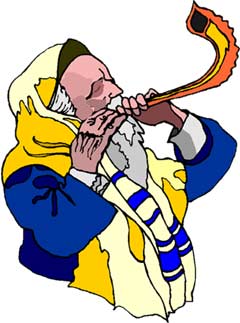 The festival of Rosh Hashanah--the name means "Head of the Year"--is observed for two days beginning on Tishrei 1, the first day of the Jewish year. It is the anniversary of the creation of Adam and Eve, the first man and woman, and their first actions toward the realization of mankind's role in G‑d's world.
The festival of Rosh Hashanah--the name means "Head of the Year"--is observed for two days beginning on Tishrei 1, the first day of the Jewish year. It is the anniversary of the creation of Adam and Eve, the first man and woman, and their first actions toward the realization of mankind's role in G‑d's world.
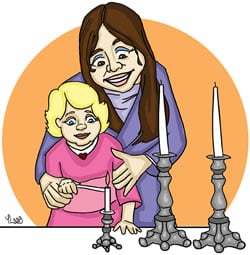 Blessings for September 18, 2009:
Blessings for September 18, 2009: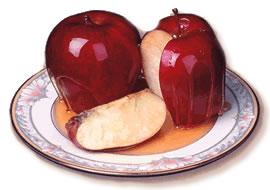 ymbolic Foods
ymbolic Foods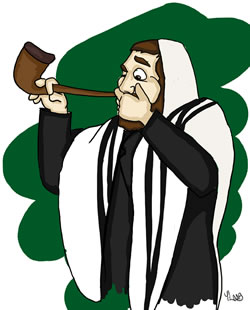 What: A shofar is a horn of a kosher animal with the marrow removed. Blow into a shofar and you get a shofar blast. Blow the right sequence of blasts at the right time of year and you've got a great mitzvah.
What: A shofar is a horn of a kosher animal with the marrow removed. Blow into a shofar and you get a shofar blast. Blow the right sequence of blasts at the right time of year and you've got a great mitzvah. On the second day of Rosh Hashanah, after the afternoon prayer, we go to a lake, river or sea (preferably a body of water that has fish), and recite the Tashlich prayers, wherein we symbolically cast our sins into the water and leave our old shortcomings behind us, thus starting the new year with a clean slate.
On the second day of Rosh Hashanah, after the afternoon prayer, we go to a lake, river or sea (preferably a body of water that has fish), and recite the Tashlich prayers, wherein we symbolically cast our sins into the water and leave our old shortcomings behind us, thus starting the new year with a clean slate.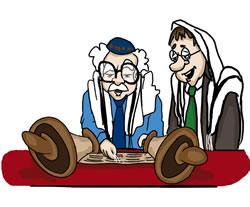 Torah Readings:
Torah Readings: